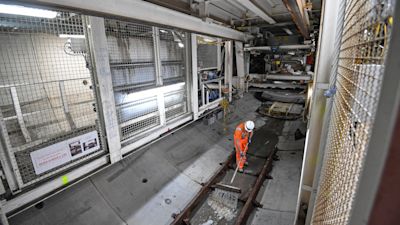Covid: Government releases new information on which roles may be exempt from self-isolation

The government has revealed more details about which workers may be able to avoid isolation if they are "pinged" by the NHS app.
The huge number of people being told to self-isolate is causing disruption for a number of industries including food and transport.
The disruption pushed the government into releasing a list of sectors whose workers may be exempt from quarantine in some circumstances.
The list of sectors includes: energy, civil nuclear, digital infrastructure, food production and supply, waste, water, veterinary medicines, essential chemicals, essential transport, medicines, medical devices, clinical consumable supplies, emergency services, border control, essential defence outputs, and local government.
However the government did not expand on which roles would be exempt from self-isolation, and said businesses in the 16 sectors would have to contact the relevant government department and tell them which roles they think should be exempt from self-isolation.
The exemption also only applies to fully vaccinated workers and they must isolate when not doing their jobs.
Several industry leaders criticised the list for not going far enough and missing out key parts of the supply chain in certain sectors.On Friday the Department for Environment, Food and Rural Affairs (DEFRA) outlined the roles the exemption would apply to.
DEFRA said the exemptions would be "subject to all other mitigation options being exhausted".
The roles include:
Agri-food chain: Engineers, quality assurance technicians, supervisors, specialist truck drivers, meat hygiene inspectors and environmental health officers.
Waste: Staff essential to the removal and processing of healthcare, hazardous, or municipal waste; staff essential to the running of incineration plants and landfill operator
Water: Engineers, chemical and technical specialists, emergency responders, and key control room staff.
Veterinarians: Laboratory staff essential to the production of batch medicines; vets responding to animal disease outbreaks or cases of serious animal health concern.
Flood defences: Staff essential to the running of all flood defences.
Navigation authority staff whose roles include essential maintenance on assets which could put a person's life at risk.
Anyone who works in the above roles will be able to leave isolation to travel to their jobs but must remain at home otherwise and quarantine if they receive a positive result.
Earlier in the week the government said the exemptions would only be open to a "limited number of named workers" in critical services.
Listen to our coronavirus podcast:
The policy only applies to named workers if their employer has received a letter from the relevant government department.
Separately, workers in the food supply industry will be exempt from self-isolation thanks to a scheme which will see them tested for coronavirus daily.
The new list will come to an end on August 16 when wider exemptions for self-isolation rules come into effect.
On Friday the GMB Union criticised the government's approach to critical worker exemptions.
They said: "The problem isn’t workers getting pinged, the problem is workers getting coronavirus."
Gary Smith, GMB General Secretary, said: “The decision taken by the Government to introduce exemptions for critical workers from self-isolation guidance has been driven by resources, not by what’s safe for the workers or their families."
James Bielby, the CEO of The Federation of Wholesale Distributors, criticised the list as having been "drawn up very hastily with not really being thought through".He said: "It creates a lot of gaps in the supply chain for businesses which are not covered - it's only factories and it's only supermarket distribution centres, its not processors, its not pickers, its not wholesalers it's not people supplying the public sector."